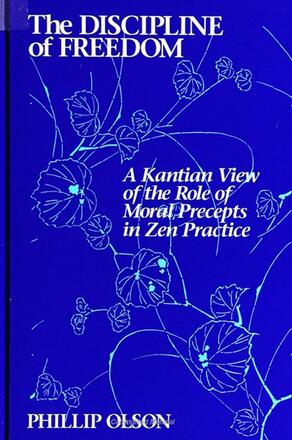Abbreviations
Preface
Chapter 1. Introduction
i. Moral Law As the Basis for Zen Meditation Practice
ii. Structure of the Study
Chapter 2. Interpreting the Term Zazen in Kantian Language
i. Why a Kantian Interpretation of Zazen ?
ii. Zazen Interpreted As a "Discipline of Freedom"
Chapter 3. In Defense of Thesis Z1:
Zazen practice, according to Suzuki, is a necessary means for realizing the requirements of moral law, as Kant understands these requirements .
i. The Practice of a Discipline of the Speculative Restriction of Reason Is, According to Kant, a Necessary Means for Attaining Consciousness of Freedom
ii. Consciousness of Freedom Interpreted As Consciousness of Emptiness
iii. Zazen Interpreted as a Discipline of the Speculative Restriction of Reason
(a) Suzuki's distinction between form and emptiness parallels Kant's distinction between phenomena and noumena
(b) Like Kant, Suzuki treats insight into the critical distinction between form and emptiness, or phenomena and noumena, as a necessary means for realizing consciousness of freedom
(c) Zazen practice, as a method of cultivating consciousness of freedom as emptiness, is a necessary means for the realization of the requirements of moral law
Chapter 4. In Defense of Thesis Z2:
In order to practice zazen correctly, according to Suzuki, my sole intention in performing that practice should be that of realizing the requirements of moral law, as Kant understands these requirements .
i. Consciousness of Duty Is Necessary, According to Both Suzuki and Kant, for Attainment of Consciousness of Freedom
ii. Compatibility of the Idea of Duty in Suzuki and Kant
(a) Interpreting what Suzuki calls consciousness of "true nature" (or "original" or ''Buddha" nature) as consciousness of a fundamental principle of morality, which is a fact of human reason
(b) How the idea of duty in both Kant and Suzuki is modeled after the way things happen in nature, according to natural laws
[1] Kant's law of nature formula for the fundamental moral principle
[2] Compatibility of Suzuki's idea of Buddha nature with Kant's idea of a fundamental moral principle modeled upon natural laws
(c) How the rules of Zen life, as Suzuki explains them, have a truly moral component when viewed from a Kantian perspective, because the stated function of these rules is the elimination of selfishness
iii. Defending Thesis Z2: The Bodhisattva Vow Interpreted As a Commitment to Realize the Highest Possible Good in this World
(a) Buddha's view of life: the Bodhisattva vow
(b) Kant's view of life: the "vow" to realize the highest possible good in the world
(c) Interpreting the object of the Bodhisattva vow as the highest possible good in the world
[1] To practice zazen with the sole intention of saving all sentient beings means to practice with the sole intention of helping people (a) realize happiness, and (b) cultivate virtue in the sense of cultivating a perfect moral character
[2] To practice zazen with the sole intention of helping people realize happiness and cultivate a perfect moral character is to practice with the sole intention of realizing what Kant understands to be the highest possible good in the world
Chapter 5. Conclusion
Appendix: Dogen and Kant
Notes
Works Cited
Index
